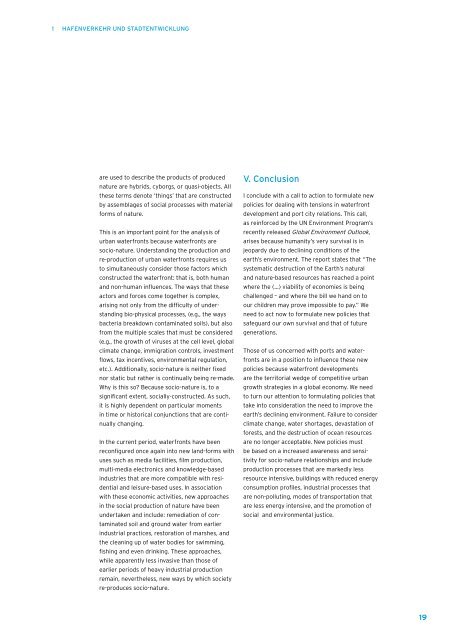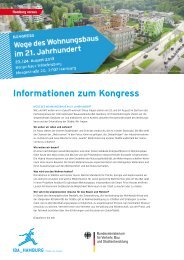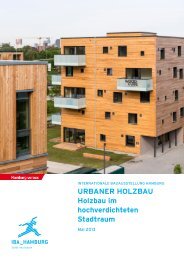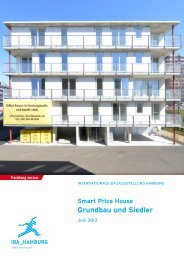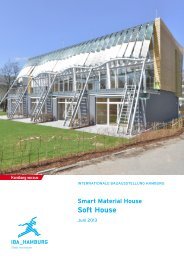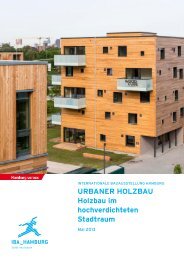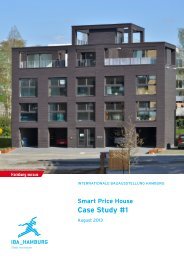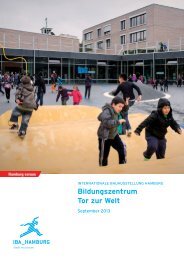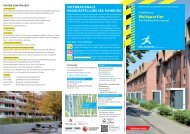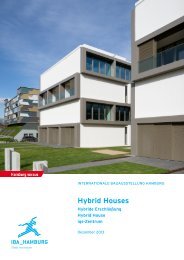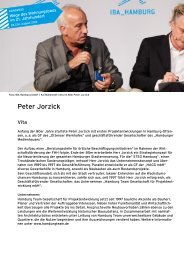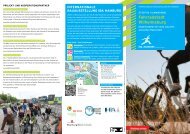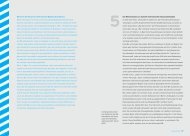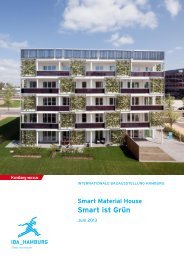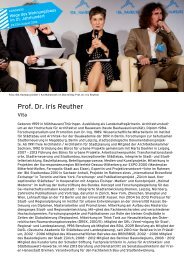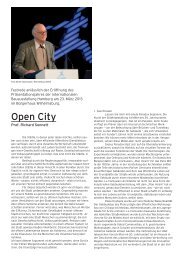Hafen-Logistik-Stadt - IBA Hamburg
Hafen-Logistik-Stadt - IBA Hamburg
Hafen-Logistik-Stadt - IBA Hamburg
Sie wollen auch ein ePaper? Erhöhen Sie die Reichweite Ihrer Titel.
YUMPU macht aus Druck-PDFs automatisch weboptimierte ePaper, die Google liebt.
<strong>IBA</strong>-LABOR 1 HAFENVERKEHR HAFEN - LOGISTIK UND STADTENTwIcKLUNG<br />
- STADT<br />
are used to describe the products of produced<br />
nature are hybrids, cyborgs, or quasi-objects. All<br />
these terms denote ‘things’ that are constructed<br />
by assemblages of social processes with material<br />
forms of nature.<br />
This is an important point for the analysis of<br />
urban waterfronts because waterfronts are<br />
socio-nature. Understanding the production and<br />
re-production of urban waterfronts requires us<br />
to simultaneously consider those factors which<br />
constructed the waterfront: that is, both human<br />
and non-human influences. The ways that these<br />
actors and forces come together is complex,<br />
arising not only from the difficulty of understanding<br />
bio-physical processes, (e.g., the ways<br />
bacteria breakdown contaminated soils), but also<br />
from the multiple scales that must be considered<br />
(e.g., the growth of viruses at the cell level, global<br />
climate change, immigration controls, investment<br />
flows, tax incentives, environmental regulation,<br />
etc.). Additionally, socio-nature is neither fixed<br />
nor static but rather is continually being re-made.<br />
Why is this so? Because socio-nature is, to a<br />
significant extent, socially-constructed. As such,<br />
it is highly dependent on particular moments<br />
in time or historical conjunctions that are continually<br />
changing.<br />
In the current period, waterfronts have been<br />
reconfigured once again into new land-forms with<br />
uses such as media facilities, film production,<br />
multi-media electronics and knowledge-based<br />
industries that are more compatible with residential<br />
and leisure-based uses. In association<br />
with these economic activities, new approaches<br />
in the social production of nature have been<br />
undertaken and include: remediation of contaminated<br />
soil and ground water from earlier<br />
industrial practices, restoration of marshes, and<br />
the cleaning up of water bodies for swimming,<br />
fishing and even drinking. These approaches,<br />
while apparently less invasive than those of<br />
earlier periods of heavy industrial production<br />
remain, nevertheless, new ways by which society<br />
re-produces socio-nature.<br />
V. conclusion<br />
I conclude with a call to action to formulate new<br />
policies for dealing with tensions in waterfront<br />
development and port city relations. This call,<br />
as reinforced by the UN Environment Program’s<br />
recently released Global Environment Outlook,<br />
arises because humanity’s very survival is in<br />
jeopardy due to declining conditions of the<br />
earth’s environment. The report states that “The<br />
systematic destruction of the Earth’s natural<br />
and nature-based resources has reached a point<br />
where the (...) viability of economies is being<br />
challenged – and where the bill we hand on to<br />
our children may prove impossible to pay.” We<br />
need to act now to formulate new policies that<br />
safeguard our own survival and that of future<br />
generations.<br />
Those of us concerned with ports and waterfronts<br />
are in a position to influence these new<br />
policies because waterfront developments<br />
are the territorial wedge of competitive urban<br />
growth strategies in a global economy. We need<br />
to turn our attention to formulating policies that<br />
take into consideration the need to improve the<br />
earth’s declining environment. Failure to consider<br />
climate change, water shortages, devastation of<br />
forests, and the destruction of ocean resources<br />
are no longer acceptable. New policies must<br />
be based on a increased awareness and sensitivity<br />
for socio-nature relationships and include<br />
production processes that are markedly less<br />
resource intensive, buildings with reduced energy<br />
consumption profiles, industrial processes that<br />
are non-polluting, modes of transportation that<br />
are less energy intensive, and the promotion of<br />
social and environmental justice.<br />
1


